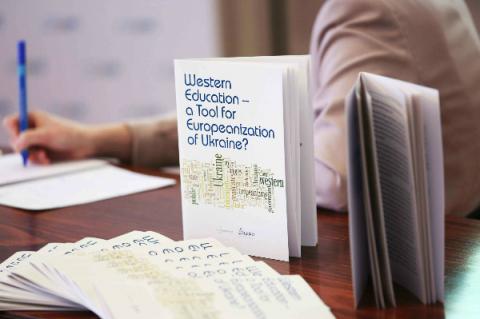"Western-Educated Reformers Could Help in Ukraine" - Event Report

Due to the ongoing war in Ukraine and the lack of fundamental change yet to be brought about by the Revolution of Dignity, Iryna Ozymok, project coordinator for the Ukrainian Institute for Public Policy, believes that "this is the moment when we need transformation the most." A participant on the Euromaidan herself, Iryna conducted the project "Global Education: A Tool for the Europeanization of Ukraine?" in cooperation with several organizations from Central and Eastern Europe to explore if and how Western-educated Ukrainians can make a difference in their country. Iryna Ozymok and CEU's Zsuzsanna Vegh presented at a Jan. 27 lecture sponsored by the Center for EU Enlargement Studies (CENS), which has been a partner in this one-year research project.
Giving background on the tumultuous history of Ukraine in the last quarter century, Iryna Ozymok noted that, despite some important changes brought about by three revolutions, the post-Soviet elites continued to maintain power.
"Ukrainians showed (through Maidan) that they were ready to participate in state-building, but the post-Soviet system is still winning," Iryna said. She noted that there is a lack of force or will to break the system and post-Soviet institutions seem to have an ability to regenerate themselves; even "new" politicians are behaving in this old-school manner. There is a deep-rooted corruption and a self-preservation mentality.
Iryna and her colleagues conducted an online survey of Ukrainian students who studied abroad to determine if Western-educated Ukrainians could be the "agents of change" the country seems to so desperately need. In total, about 380,000 Ukrainians have studied abroad since 1998, with roughly 60 percent of them returning to their home country. Of those who came back, most were looking for jobs in business and at NGOs, not in public service. "The majority feel they can bring change based on their Western degrees. And they think it can be applicable in public service, but only if it's reformed."
Reforms that those surveyed feel are necessary include: a complete revision of the functions of the government machine; a significant raise in the salaries in public sector; transparent hiring and promoting processes; and top-down delegation of responsibilities.
One way Western-educated Ukrainian alumni are already involved with the government is in consultancy roles. So far, there have been over 50 requests from different government agencies addressed to the Professional Government Initiative, created on the basis of Ukrainian alumni associations of foreign universities, as an easier option, just after the Maidan, was to create teams of advisors. One of the most active agencies submitting requests has been the Security Service of Ukraine.
"We don't say that foreign education is a prerequisite for reforms, but we think it helps because it gives a global perspective," Iryna said. "And, the Ukrainian educationsystem is very corrupt. We have great potential and we have a choice, I think, to be agents of change but, still, it's not easy in Ukraine."
Zsuzsanna Vegh, a research assistant at CENS, presented results of a project on the effects of Western education in the Visegrad countries, particularly Hungary.
"We looked at the makeup of governments up to 2014. In the Hungarian case, since 1990, we had around 145 ministers – out of these, 13 had some sort of Western education but only one was a graduate (the others completed exchange programs but didn't earn a foreign degree). The case was similar in other Visegrad countries," she explained. "Based on this, we could not conclude that it was Western-educated professionals/politicians who pushed their countries toward Western integration. A common theme, though, was the desire to join the Western system and this shaped the elites. It was the prospect of European integration that was the catalyst to shape the reforms, not the individuals."
As countries in Central and Eastern Europe opened up, more and more opportunities arose. Students could go abroad for exchanges or degrees, she noted. Her report reflects the opportunities, or rather lack thereof, in Visegrad countries with the state investing in people to educate them abroad and bring them back. "We were very hopeful to find good examples but didn't find any. In fact, we found that state support for students to study abroad was miniscule. Funds were coming from private funders or organizations."
There are, she said, small-scale programs meant to assist those who want to study abroad – like the LEAF program in Slovakia and the Polish effort to attract Western-educated graduates and place them in well-paid training positions in various ministries. In Hungary, on the other hand, she pointed out that it is more difficult for foreign-educated graduates to find work in Hungarian public service, as their degrees must be "naturalized" via a lengthy bureaucratic process before they can apply for such training programs.
Private sector surveys have revealed that companies are, indeed, interested in hiring people with foreign experience, Zsuzsanna noted. "It is not just due to language skills but the openness associated with living abroad, the attitude and mentality. The private sector values this mentality. Nonetheless, there is no structured support for foreign education." Another important factor she highlighted is the fact that, although the private sector values foreign experience, they cannot really pay for it.
CENS Director Peter Balazs concluded the session by noting that Western education is not a guarantee of change. "However, what a government can do is to inspire education in every form and make the conditions attractive to bring scholars home."
The report originally appeared on CEU's main website.
The video report prepared in the framework of the project was also showed at the event and can be viewed here.
The project was supported by the International Visegrad Fund.
